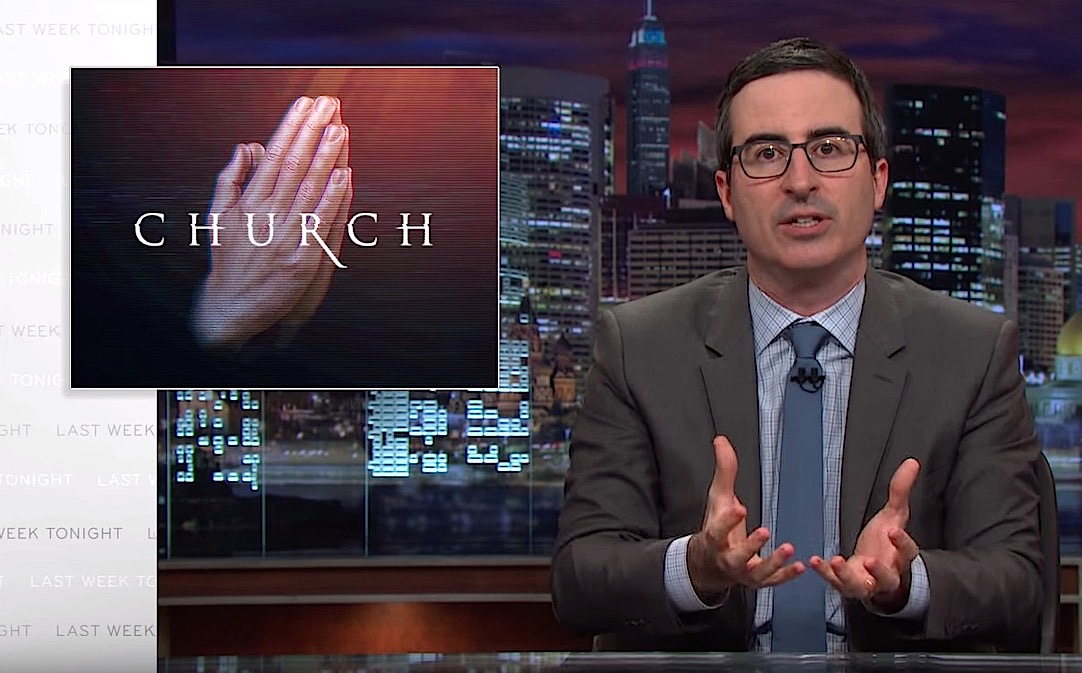John Oliver starts a church to preach against televangelists and their shady 'prosperity gospel'


A free daily email with the biggest news stories of the day – and the best features from TheWeek.com
You are now subscribed
Your newsletter sign-up was successful
On Sunday's Last Week Tonight, John Oliver took on the preachers and the sinners — or, more precisely, the TV preachers who prey on their congregants to finance their lavish lifestyles, and the IRS that is legally bound to let them. "There are roughly 350,000 congregations in the United States, and many of them do great work: Feeding the hungry, clothing the poor," Oliver explained, lest you think he is anti-religion. "But this is not a story about them — this is about the churches who exploit people's faith for monetary gain."
Televangelists were a big deal in the 1980s, until many of them were publicly disgraced, but "though you may not realize it, televangelism is thriving in this country," Oliver said. You may have heard of Creflo Dollar's congregation-funding drive for a new $65 million private jet, but that's apparently a common request for televangelists. And it's only the tip of the iceberg.
This would all be funny, Oliver said, if there weren't real victims — and not just financial ones. Cue a terrible story about a woman who sent Gloria Copeland and her husband thousands of dollars instead of getting cancer treatment, because Copeland said that was a better bet. And to follow the money, Oliver sent hundreds of dollars to televangelist Robert Tilton over seven months of correspondence — and he shared the highlights with viewers.
The Week
Escape your echo chamber. Get the facts behind the news, plus analysis from multiple perspectives.

Sign up for The Week's Free Newsletters
From our morning news briefing to a weekly Good News Newsletter, get the best of The Week delivered directly to your inbox.
From our morning news briefing to a weekly Good News Newsletter, get the best of The Week delivered directly to your inbox.

Everything these "prosperity gospel"–touting preachers do is not only legal, but tax-free, Oliver noted sourly, but he wasn't just shooting spitballs. He talked to a tax lawyer and founded "Our Lady of Perpetual Exemption," a real church per IRS guidelines, "and it was disturbingly easy," he said. It's not clear if he really wants you to send him and "Wanda-Jo Oliver" (Rachel Dratch) money to prove his point, or perhaps to get him busted by the IRS, but it's probably safest to sit on your wallet and wait for the follow-up episode. There is some mild swearing, but you'll learn something if you watch the video above.
A free daily email with the biggest news stories of the day – and the best features from TheWeek.com
Peter has worked as a news and culture writer and editor at The Week since the site's launch in 2008. He covers politics, world affairs, religion and cultural currents. His journalism career began as a copy editor at a financial newswire and has included editorial positions at The New York Times Magazine, Facts on File, and Oregon State University.
-
 The 8 best TV shows of the 1960s
The 8 best TV shows of the 1960sThe standout shows of this decade take viewers from outer space to the Wild West
-
 Microdramas are booming
Microdramas are boomingUnder the radar Scroll to watch a whole movie
-
 The Olympic timekeepers keeping the Games on track
The Olympic timekeepers keeping the Games on trackUnder the Radar Swiss watchmaking giant Omega has been at the finish line of every Olympic Games for nearly 100 years
-
 ‘One Battle After Another’ wins Critics Choice honors
‘One Battle After Another’ wins Critics Choice honorsSpeed Read Paul Thomas Anderson’s latest film, which stars Leonardo DiCaprio, won best picture at the 31st Critics Choice Awards
-
 A peek inside Europe’s luxury new sleeper bus
A peek inside Europe’s luxury new sleeper busThe Week Recommends Overnight service with stops across Switzerland and the Netherlands promises a comfortable no-fly adventure
-
 Son arrested over killing of Rob and Michele Reiner
Son arrested over killing of Rob and Michele ReinerSpeed Read Nick, the 32-year-old son of Hollywood director Rob Reiner, has been booked for the murder of his parents
-
 Rob Reiner, wife dead in ‘apparent homicide’
Rob Reiner, wife dead in ‘apparent homicide’speed read The Reiners, found in their Los Angeles home, ‘had injuries consistent with being stabbed’
-
 Hungary’s Krasznahorkai wins Nobel for literature
Hungary’s Krasznahorkai wins Nobel for literatureSpeed Read László Krasznahorkai is the author of acclaimed novels like ‘The Melancholy of Resistance’ and ‘Satantango’
-
 Primatologist Jane Goodall dies at 91
Primatologist Jane Goodall dies at 91Speed Read She rose to fame following her groundbreaking field research with chimpanzees
-
 Florida erases rainbow crosswalk at Pulse nightclub
Florida erases rainbow crosswalk at Pulse nightclubSpeed Read The colorful crosswalk was outside the former LGBTQ nightclub where 49 people were killed in a 2016 shooting
-
 Trump says Smithsonian too focused on slavery's ills
Trump says Smithsonian too focused on slavery's illsSpeed Read The president would prefer the museum to highlight 'success,' 'brightness' and 'the future'
